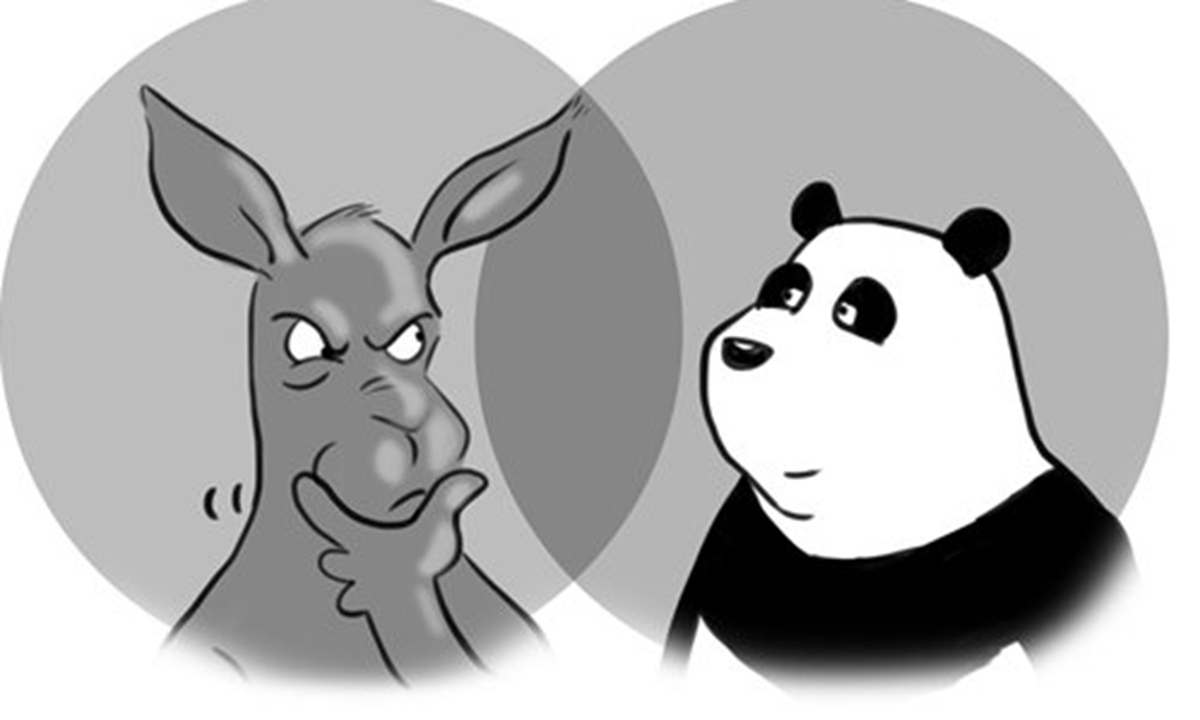Australia’s China hawks set obstacle for bilateral relations
Source: Global Times Published: 2020/8/3 20:43:40

Illustration: Liu Rui/GT
South Australian Senator Rex Patrick on Sunday tweeted that, "Action is needed to protect Australia's power grid from foreign disruption. We need to remove companies controlled or significantly influenced by the Chinese Government. Power equipment made in China may involve unacceptable risk." In July, Patrick expressed his anti-China rhetoric as well, hoping at least 1,000 Chinese diplomats and consular staff would be kicked out of Australia.
Amid escalating tensions between China and the US, some Western countries, led by the US, have spared no effort to slander China. Against this backdrop, it is not surprising to hear Patrick's hard-line voice against China from Australia - one of the most intimate allies of the US. Such rhetoric echoes with China hawks in countries like the US, the UK, Australia and Canada. When they make public comments, their priority is not on how to achieve economic gains for their countries, but to pursue the "political correctness" - to be tough against China. They make good use of almost every opportunity to boost the anti-China campaign.
According to Patrick's profile, there is no evidence showing that he has been to China or has dealt with any China-related affairs.
Those who have never been to China can sometimes be biased in their understanding of China, especially for some elderly people. They tend to judge what China is like based on their past experience. This is way outdated. Patrick is one of them.
Patrick may also intend to gain more political influence by making such rhetoric in a bid to win support from more voters and gain a favorable position in his party. Additionally, there is the possibility that some US anti-China forces are behind him, urging him to deliver tough messages against China in Australia.
Such politicians who are blind in their denouncements against China may not account for a large proportion in Australia's political circle. But their voices tend to be loud. This has soured the whole political atmosphere.
From the perspective of the Australian government, it will not want to refer to such hard-line proposals against China. When making foreign policies, the Australian government will have to consider more about its national interests. Canberra has a more objective view toward Beijing in comparison with these hawks. China and Australia have common economic interests. Canberra will not hope to see further deterioration of its ties with China, especially the economic ties.
However, such anti-China rhetoric will influence the public opinion in Australia. If top leaders completely ignore these words, their political status could be shaken and may lose favor from voters. Therefore, such anti-China views will indirectly influence the policymaking of the Australia government. Canberra may to some extent cater to such rhetoric.
Some Australian politicians and media outlets have smeared China at an unprecedented rate. First, this is because Australia's China policy has been significantly influenced by the US. The US has ramped up its confrontation with China and Australia is just following suit. Second, the pandemic has intensified Australia's anxiety about China. Many Australians have a bias against China and they did not anticipate that China could efficiently and properly bring the epidemic under control.
Whereas the Australian government has not successfully handled COVID-19, Australian citizens are becoming less confident. This is particularly the case when they see China's mounting influence resulting from its success in battling the coronavirus novel as a "threat."
The side that is impairing China-Australia relationship has always been Australia. Australian politicians such as Patrick who smear China are doing extraordinary damage to bilateral ties. This sets forth a big obstacle for the improvement of China-Australia relations.
The article was compiled by Global Times reporter Lu Yuanzhi based on an interview with Zhou Fangyin, a professor at the Guangdong Research Institute for International Strategies. opinion@globaltimes.com.cn
Posted in: VIEWPOINT